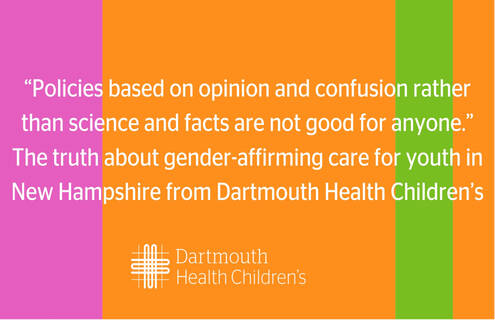
Across the country, politicized misinformation and disinformation is being used to misrepresent transgender and gender-nonconforming youth. For example, the term “Rapid Onset Gender Dysphoria” (ROGD) is being used in social and traditional media to discredit the decisions and life experiences of trans people. ROGD is not a medical or mental health diagnosis and is not used by healthcare professionals.
Nevertheless, many states have restricted or banned access to care for transgender individuals; state legislatures—including New Hampshire—are considering enacting similar laws that are not based upon medical assessments and would deny important treatments. Policies that are based on opinion and confusion rather than science and facts are not good for anyone. We write to share the truth about gender-affirming care for youth here in New Hampshire.
First, this care has been available for decades. It’s not new. Second, it is always delivered in an age-appropriate way and with evidence-based treatment protocols. Third, decisions are made over time in consultation with doctors and other medical professionals and with the involvement and consent of parents or guardians when minors under the age of 18 seek this care.
The exploration of gender identity often involves stepping outside of the prescribed societal ideas of masculine and feminine to think about gender differently. As Blair Peters, MD, a plastic and reconstructive surgeon, notes, “It is an important thing to understand with gender identity and exploration of gender identity, there's no right or wrong outcome, and there's no right or wrong destination. We should encourage people to ask questions and to find their own answers, but we shouldn't be invested in where they land or what is the most authentic version of themselves.” Approximately 300,000 youth (ages 13 to 17) in the United States (less than 0.8% of the population) identify as transgender or gender diverse. (Williams Institute, 2022). Only a small subset of these youth will affirm their gender identity with medical or surgical treatments.
At Dartmouth Health Children’s, we provide rigorous and thoughtfully delivered care and caring to all children and adolescents. Gender-affirming care starts with not assuming the gender identity of any individual and can be delivered in any setting. Using correct and affirming pronouns is a universal sign of respect. Every major U.S. medical and mental health organization—including the American Medical Association, the American Academy of Pediatrics, and the American Psychological Association—recognize that affirming and supporting gender identity is essential medical care for transgender and gender-diverse youth.
Some people will transition socially, changing their name, clothing, or other outward appearance from the gender assigned to them at birth. Others will seek to change their bodies to match their gender identity, using medicines that can prevent pubertal changes if early enough, along with male or female hormones. For minors, such medical treatments are only considered after a comprehensive multidisciplinary evaluation that includes a specially trained mental health professional. No minor leaves a doctor’s office with a prescription on their first visit. We do not perform gender-affirming genital surgeries on people under the age of 18 at Dartmouth Health Children’s, nor does anyone else in New Hampshire. The rare surgical procedures performed in the state are for adults.
When we define and enforce what masculinity and femininity must look like, we reinforce outdated ideas of what gender roles should be. Fundamentally, gender identity is a decision of an individual. In New Hampshire, minor patients, their parents, and their doctors should decide together on what aspects of gender-affirming care are appropriate for them.
This opinion piece was written by Dartmouth Health Children’s Frances B. Lim Liberty, MD, Medical Director, Pediatric and Adolescent Transgender Program; Keith J. Loud, MD, MSc, Physician-in-Chief; and Jessica A. Smith, MSN, APRN, Coordinator, Pediatric, Adolescent and Young Adult Transgender Health Clinics.
About Dartmouth Health Children's
Dartmouth Health Children's is the only comprehensive pediatric healthcare system in the region. Fully integrated in Dartmouth Health and anchored for more than 30 years by Children's Hospital at Dartmouth Hitchcock Medical Center (CHaD)—in Lebanon, NH—Dartmouth Health Children's promotes health, advances knowledge, and delivers the best patient and family-centered care for infants, children, and adolescents across New Hampshire and Vermont. Dartmouth Health Children's conducts groundbreaking research and educates the next generations of health professionals as the primary pediatric partner of the Geisel School of Medicine at Dartmouth. Highly skilled and collaborative child health professionals provide care in multiple settings across the region. Outpatient specialty visits and same-day surgery services are available at Children's Hospital at Dartmouth Hitchcock Medical Center (CHaD) and Dartmouth Hitchcock Clinics Manchester. Primary care appointments in general pediatrics are available at Dartmouth Hitchcock Clinics in Bedford, Concord, Lebanon, Manchester and Nashua, NH and Bennington, VT; as well as at Dartmouth Health members: Alice Peck Day Memorial Hospital, Cheshire Medical Center, New London Hospital and Mt. Ascutney Hospital and Health Center.